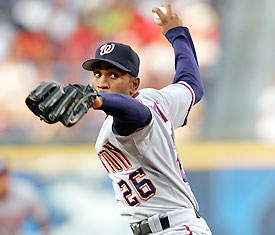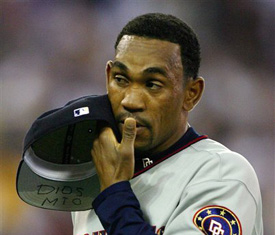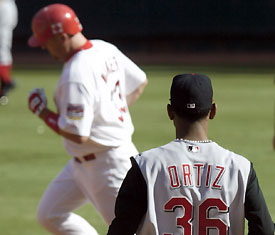January 21, 2007
Ay Dios Mio: The Ramon Ortiz Signing
Ortiz spent last season pitching in the significantly inferior National League and played his home games in one of baseball's most pitcher-friendly ballparks, the spacious RFK Stadium in Washington. Despite having those two sizable advantages, Ortiz posted a horrendous 5.57 ERA for the Nationals and allowed opponents to bat .297/.367/.486 against him. In other words, he essentially turned every hitter he faced last season into Michael Cuddyer.
Among the 38 NL pitchers who threw enough innings to qualify for the ERA title in 2006, Ortiz ranked second-to-last in ERA and third-to-last in opponent's batting average, on-base percentage, and slugging percentage. Once you account for how pitcher-friendly his home ballpark was, a decent argument could probably be made for Ortiz being the single worst starting pitcher in the league last season.
Given that the Twins just handed him $3.1 million and a spot in the starting rotation, you'd assume that Ortiz's brutal 2006 numbers must have been way out of line with the rest of his career, but that's not the case. In fact, his 2005 performance was similarly awful. Pitching for the Reds, Ortiz posted a 5.36 ERA while allowing opponents to bat .302/.353/.529 against him, which is dangerously close to making everyone who stepped to the plate look like Justin Morneau.
Ortiz is a former top prospect who throws relatively hard, which is surely why the Twins think he has some sort of untapped potential. In reality, Ortiz is 34 years old and managed a 5.47 ERA while pitching in an inferior league over the past two seasons. He doesn't strike many batters out, doesn't have particularly good control, and serves up a ton of homers. Handing Ortiz a spot in the starting rotation is not as bad as handing Tony Batista the starting job at third base, but it's close enough.
It's early, but I've already heard an incredible number of people defend the Ortiz signing by using the same misguided logic and wishful thinking they used to defend signing Batista. Like with Batista, all the statistical, performance-based evidence in the world points to Ortiz being horrible, yet it's as if Twins fans learned nothing from last year's experience. More importantly, it's as if the Twins learned nothing either.
Signing Ortiz provides another blatant example supporting my long-standing claim that the Twins' biggest organizational weakness is the inability to fully trust the outstanding young talent they develop. It's the same thinking that kept Johan Santana in the bullpen long after he was clearly the team's best pitcher and kept Cuddyer from securing a full-time place in the lineup until he made it impossible not to give him one last year.
It's the same thinking that led to signing a no-upside, sure disaster like Batista in the first place or letting Juan Castro drag the team down just so the Twins could avoid giving Jason Bartlett an opportunity he had clearly earned. Few teams do a better job than the Twins when it comes to acquiring and developing young players, but few teams do a worse job when it comes to trusting that talent once it's ready to play.
Ortiz isn't quite the sure disaster Batista was, but in some ways signing him is actually the worse move. With Batista, the monetary commitment was relatively small and the Twins didn't have a clear alternative at third base among their collection of young players. With Ortiz, it's $3.1 million out the window and the Twins have less need for a horrible starting pitcher than just about any other team thanks to their abundance of talented, major league-ready young hurlers.
 Rather than trust Boof Bonser, Matt Garza, Scott Baker, Glen Perkins, and Kevin Slowey, the Twins will pay a premium for a guy who'll be lucky to avoid a 5.00 ERA. Instead of learning from the past and going with upside and talent over mediocrity and experience, it's the same old story. What makes this version even worse is that not only did the Twins give up $3.1 million for the privilege of letting Ortiz serve up homers in the Metrodome, they lost a talented young player in the process.
Rather than trust Boof Bonser, Matt Garza, Scott Baker, Glen Perkins, and Kevin Slowey, the Twins will pay a premium for a guy who'll be lucky to avoid a 5.00 ERA. Instead of learning from the past and going with upside and talent over mediocrity and experience, it's the same old story. What makes this version even worse is that not only did the Twins give up $3.1 million for the privilege of letting Ortiz serve up homers in the Metrodome, they lost a talented young player in the process.
In order to clear space on the 40-man roster for Ortiz, the Twins waived 23-year-old outfield prospect Alex Romero. Romero is likely unknown to most of the same fans who think signing a "name" like Ortiz was a good idea, but he was a solid prospect in an organization that is severely lacking in talented young position players. In fact, Romero would have ranked No. 18 in my ongoing Top 40 Twins Prospects of 2007 series.
Romero struggled in his first crack at Triple-A, but he's a speedy outfielder who batted .296/.362/.459 in 187 games at Double-A over the past two years. He's not going to become a superstar, but Romero is simply not the type of player you risk losing in order to clear roster space for someone like Ortiz. The Twins essentially gave up $3.1 million and their 18th-best prospect for a 34-year-old pitcher who might give them 175 innings of a 5.00 ERA if things go well, which is as obvious as a bad decision can be.
Interestingly, the biggest head-scratcher in a series of moves filled with head-scratchers is that the Twins didn't even have to risk losing Romero. They could have cleared space for Ortiz on the 40-man roster by waiving Chris Heintz, a 33-year-old catcher with a career .288/.326/.403 hitting line in 280 games at Triple-A who will never be more than a passable backup. If that wasn't bad enough, the Twins have a more-than-passable backup catcher, Mike Redmond, signed through 2009.
To recap: The Twins handed $3.1 million to a horrible pitcher rather than trust one of the talented young pitchers they've developed, chose to protect a 33-year-old third-string catcher over a 23-year-old outfield prospect, and then lost that outfield prospect for nothing when another team smartly claimed him off waivers. If the above series of moves and decisions doesn't shine a bright light on the Twins' organizational weakness, I don't know what will. Ay dios mio, indeed.



